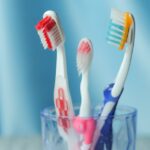Welcome to Your Guide on Daily Habits for Optimal Oral Hygiene
Imagine starting every day knowing you’re taking the best care of your teeth and gums, naturally and effectively. In today’s health-conscious world, more and more people are seeking ways to maintain healthy teeth and gums without relying on harsh chemicals. This comprehensive guide is designed to empower you with simple, chemical-free practices that will keep your smile bright and your mouth healthy.
Maintaining optimal oral hygiene is essential not just for a radiant smile, but for overall health. Issues like gum disease and tooth decay can lead to more serious health problems if left unchecked. Fortunately, there are daily habits you can adopt that don’t involve chemicals and are easy to integrate into your routine. This post will explore these habits, providing you with practical tips and natural alternatives that promote oral health.
From the foods that fortify your teeth to the natural products that can replace your standard toothpaste and mouthwash, we’ll dive into a variety of topics that cover all aspects of maintaining a healthy mouth. Whether you are looking to overhaul your oral care routine or just tweak it to be a bit more natural, this guide has something for everyone.
So, grab your bamboo toothbrush, and let’s embark on a journey to cleaner, healthier teeth and gums, all without the use of chemicals. It’s time to transform your daily oral hygiene routine into something not only beneficial for your mouth but also good for the environment!

Key Takeaways
- Brush Regularly: Brush your teeth at least twice a day using a soft-bristled brush and fluoride-free toothpaste to remove plaque and prevent dental diseases.
- Opt for Natural Toothpaste: Choose toothpastes that contain natural ingredients like baking soda, coconut oil, or essential oils, which can effectively clean teeth without harsh chemicals.
- Floss Daily: Flossing at least once a day helps remove food particles and plaque from between the teeth and under the gumline, areas often missed by brushing alone.
- Use a Tongue Scraper: Clean your tongue daily with a scraper to remove bacteria and promote fresher breath. This also enhances the overall cleanliness of your mouth.
- Eat a Balanced Diet: Consume foods rich in vitamins and minerals, such as calcium and vitamin D, to support oral health. Avoid sugary snacks and drinks that can lead to tooth decay.
- Stay Hydrated: Drinking plenty of water throughout the day helps wash away food particles and bacteria, and promotes saliva production which is vital for oral health.
- Regular Dental Check-ups: Visit your dentist at least twice a year for professional cleanings and check-ups to catch any potential issues early and maintain overall oral health.
The Importance of Natural Oral Hygiene
Maintaining optimal oral hygiene is crucial not just for a radiant smile, but for overall health as well. Recent studies have highlighted how oral health affects the entire body, linking poor oral hygiene to ailments such as heart disease and diabetes. Emphasizing natural methods to uphold dental health can be equally effective without the use of harsh chemicals.
Understanding Oral Hygiene and Its Systemic Impact
Oral hygiene isn’t just about avoiding cavities; it’s about preventing bacteria in the mouth from becoming harmful. This bacteria, if not controlled, can lead to gum disease, which recent research links to increased risks of chronic diseases, including heart conditions and stroke. By adopting chemical-free oral care routines, individuals can reduce their exposure to potentially harmful substances while safeguarding their mouth and body health.
Advantages of Chemical-Free Oral Health Practices
Choosing natural oral hygiene practices offers numerous benefits:
- Reduced Health Risks: Many traditional oral care products contain substances like triclosan and sodium lauryl sulfate, which can be harsh and cause irritation. Natural alternatives, such as baking soda, essential oils, and herbal extracts, provide effective cleansing without these risks.
- Environmental Benefits: Natural oral care products typically use eco-friendly ingredients and sustainable packaging, reducing environmental impact.
- Cost-Effectiveness: Many natural remedies utilize common household items, making them a budget-friendly option compared to commercial products.
Integrating simple, natural solutions into daily oral care routines can lead to improved health outcomes and contribute to a healthier environment. For instance, using a saltwater rinse can combat bacteria effectively, while oil pulling with coconut oil can help in reducing plaque and whitening teeth naturally.
Ultimately, the choice to go chemical-free in oral care isn’t just about personal health — it’s about making a positive impact on the environment and embracing a holistic approach to wellness. As more people become aware of the benefits of natural oral hygiene, it paves the way for healthier lifestyles and a better understanding of the interconnectedness of our health and the world we live in.
Fundamentals of Dental Health
Maintaining optimal oral health is pivotal for overall well-being. Understanding the fundamentals of dental health can help you establish a routine that prevents common dental issues naturally, without relying on chemicals.
Role of Saliva in Oral Health
Saliva plays a crucial role in maintaining dental health. It acts as a natural cleanser that not only helps in digesting food but also neutralizes harmful acids produced by bacteria in the mouth. These properties aid in preventing tooth decay and gum disease. Ensuring adequate hydration throughout the day stimulates saliva production, which is essential for a healthy mouth.
Common Dental Issues and Their Natural Prevention Strategies
Several common dental problems can be effectively managed with natural remedies and good hygiene practices. Here’s how:
- Tooth Decay: Regular brushing and flossing, using fluoride-free toothpaste, can significantly reduce the risk of cavities. Incorporating foods rich in fiber and low in sugar also contributes to healthier teeth.
- Gum Disease: Gum health is critical and can be maintained by using a soft-bristled toothbrush and natural mouthwashes like those made from tea tree oil or salt water. Gentle brushing around the gum line removes plaque without causing irritation.
- Bad Breath: Often a sign of underlying dental issues, bad breath can be alleviated by maintaining proper oral hygiene and using natural mouth fresheners such as parsley, mint, or fennel seeds.
Regular dental check-ups, although not a daily habit, are essential in preventing and identifying any potential dental health issues early. Opt for cleanings and consultations with your dentist to keep your oral health on track.
By integrating these practices into your daily routine, you can ensure that your teeth and gums remain healthy naturally. Remember, preventive care is the key to avoiding long-term dental problems.
Natural Practices for Daily Dental Care
Brushing Techniques Using Natural Toothpaste Options
Maintaining a radiant smile starts with the right brushing techniques and using natural toothpaste. Opt for toothpastes that contain ingredients like baking soda, coconut oil, and essential oils such as peppermint or tea tree oil. These natural components are not only effective in cleaning your teeth but also promote gum health without the harsh chemicals found in traditional toothpastes. Brush gently in a circular motion to ensure you’re not eroding the tooth enamel while reaching all surfaces effectively.
The Importance of Flossing and Alternatives to Traditional Floss
Flossing daily is crucial for removing debris that your toothbrush can’t reach, thus preventing gum disease and tooth decay. For those seeking a natural approach, consider alternatives like biodegradable silk floss or water flossers. Silk floss is gentle on the gums and better for the environment, while water flossers use a stream of water to clean between your teeth and along the gum line, providing an effective and chemical-free way to maintain dental hygiene.
Rinsing: Effective Natural Mouthwashes
Rinsing with a natural mouthwash is an excellent finale to your dental care routine. Create your own mouthwash by mixing water with natural antiseptics such as salt, or antibacterial agents like witch hazel. Another option is to use herbal rinses made from peppermint or chamomile tea, which offer soothing and antimicrobial properties. These natural rinses help in reducing bacteria, freshening breath, and promoting a healthy pH balance in the mouth.
Summary of Daily Natural Dental Care
- Choose natural toothpaste with ingredients like coconut oil or baking soda.
- Adopt gentle brushing techniques to protect enamel and reach all areas.
- Use silk floss or water flossers as eco-friendly flossing alternatives.
- End your routine with a homemade or herbal-based natural mouthwash.
Integrating these natural dental care practices into your daily routine can lead to healthier teeth and gums, ensuring a bright and confident smile without relying on harsh chemicals.
Eating for a Healthy Mouth
Maintaining optimal oral health extends beyond brushing and flossing. It involves making smart dietary choices that not only prevent dental issues but also boost your overall health. Understanding the link between the foods you consume and your dental health can lead to better choices that enhance the strength and longevity of your teeth and gums.
Foods That Promote Dental Health
Incorporating certain foods into your diet can have a profound impact on your oral hygiene. Crunchy fruits and vegetables, like apples, carrots, and celery, act almost like natural toothbrushes. Eating them helps to scrub away plaque and food particles from your teeth. Dairy products such as cheese, milk, and yogurt are high in calcium and phosphates which help to remineralize teeth and fortify the enamel. Additionally, green teas contain polyphenols that suppress the growth of bacteria leading to plaque while ensuring fresher breath.
Foods and Habits to Avoid for Better Oral Health
To safeguard your mouth’s health, it is crucial to limit the intake of sugars and starches. These compounds contribute to the formation of acids in the mouth, accelerating tooth decay. Sticky candies and dried fruits can cling to teeth, leading to prolonged acid attacks on enamel. It’s also advisable to avoid excessive snacking, which can increase the time teeth are exposed to damaging substances.
The Role of Vitamins and Minerals in Dental Health
Vitamins and minerals play essential roles in oral health. Calcium and Vitamin D are vital for maintaining healthy teeth structure, while Vitamin C helps to keep the gums strong. Zinc, found in grains, nuts, and meats, helps fight bacteria and build a robust oral cavity defense system. A well-balanced diet rich in these nutrients can significantly decrease the risk of periodontal disease and tooth decay.
By choosing the right foods and being mindful of harmful habits, you can maintain a healthy mouth with fewer chemicals and interventions. This natural approach not only benefits your oral health but also enhances your overall wellness.
Incorporating Traditional and Modern Techniques for Oral Hygiene
Maintaining healthy teeth and gums is pivotal for overall health, and blending both traditional and modern oral hygiene methods can be particularly effective. Here are some time-honored techniques complemented by contemporary practices that can enhance your dental health without relying on harsh chemicals.
Oil Pulling: Methods and Benefits
Oil pulling is an ancient practice that involves swishing oil, typically coconut or sesame, in the mouth for about 15 to 20 minutes to reduce bacteria, freshen breath, and promote healthier gums. This method works by trapping bacteria within the oil, which is then expelled when you spit out the oil. The benefits include reducing plaque, preventing cavities, and even naturally whitening your teeth.
Herbal Remedies for Gum Health
Various herbs have been used for centuries to maintain gum health. Aloe vera, for example, can be applied directly to the gums to soothe irritation and reduce inflammation. Another herb, Neem, known for its antibacterial properties, can be used in the form of mouthwash or directly applied as a paste to combat gum disease. These herbal remedies are not only effective but also gentle on the mouth.
The Benefits of Green Tea for Oral Health
Green tea is more than just a soothing beverage; it’s packed with antioxidants that fight oral bacteria. Regular consumption of green tea has been linked to reduced risk of gum disease and cavities, thanks to its natural anti-inflammatory and antibacterial properties. Drinking one to two cups a day can significantly improve your oral health, freshen your breath, and boost your body’s overall antioxidant intake.
Incorporating these traditional practices with modern dental care, such as using fluoride-free toothpastes and gentle dental floss, offers a holistic approach to maintaining oral hygiene. By using methods that have stood the test of time, complemented by current dental advances, you can ensure that your teeth and gums are healthy naturally. Embrace these habits daily for optimal results and a brighter, healthier smile.
Balancing Professional Dental Care with Natural Methods
Maintaining oral health is a delicate balance between professional dental care and natural methods. While visiting your dentist regularly is crucial, integrating natural practices can enhance your dental hygiene routine and promote long-term oral health.
When to See a Dentist
Regular dental check-ups are essential, typically recommended every six months. However, if you experience any unusual symptoms such as persistent bad breath, toothache, or bleeding gums, it’s imperative to schedule an appointment immediately. These could be signs of underlying issues that require professional attention.
Integrating Professional Recommendations with Natural Care
After your dental visit, incorporating the advice of your dentist with natural remedies can be highly beneficial. For instance, if your dentist highlights the onset of gingivitis, along with their treatment plan, you might consider adding salt water rinses or oil pulling with coconut oil to your daily routine. These natural methods have antibacterial properties and can help reduce inflammation and eliminate bacteria.
The Future of Natural Oral Health Practices
As the popularity of holistic health continues to grow, so does the integration of natural oral health practices. Research into natural remedies is expanding, offering a promising future where dental care aligns more closely with natural health solutions.
For example, neem sticks, used for thousands of years in traditional Indian medicine, are being studied for their effectiveness in preventing plaque and gingivitis. Similarly, herbal mouthwashes containing ingredients like aloe vera, clove, and peppermint are gaining traction as effective, natural alternatives to their chemical counterparts.
Incorporating these natural methods into your daily oral hygiene routine not only supports your dental health but also aligns with a more sustainable and chemical-free lifestyle. By staying informed and proactive about both professional dental care and natural health practices, you can ensure optimal oral health for years to come.
Conclusion
Embracing a natural approach to oral hygiene not only aligns with eco-friendly practices but also ensures the health of your teeth and gums. Throughout this blog post, we’ve explored the importance of natural oral hygiene, underscoring how simple daily habits can profoundly impact our dental health. From the fundamentals of dental health to natural practices for daily dental care, we’ve covered essential steps that anyone can incorporate into their routine.
By eating for a healthy mouth, you are choosing foods that fortify your teeth and gums naturally. Moreover, combining traditional and modern techniques offers a holistic approach that respects both ancient wisdom and contemporary science. It’s crucial to balance these with regular professional care, integrating professional dental care with natural methods to maintain optimal oral health.
As we continue to seek out ways to reduce chemical use in our daily lives, turning to nature for solutions in dental care not only preserves our health but also the environment. Let’s keep smiling brightly with a commitment to these gentle yet effective practices.



















